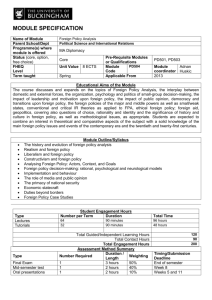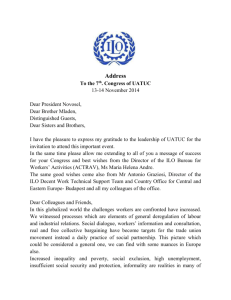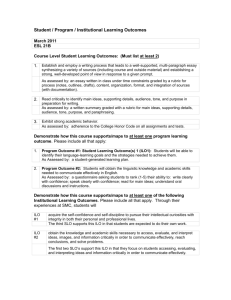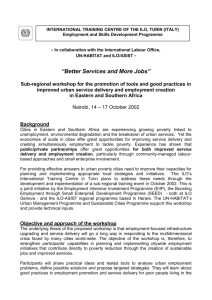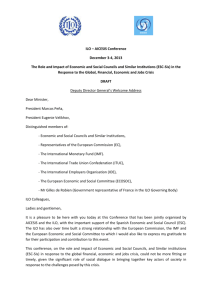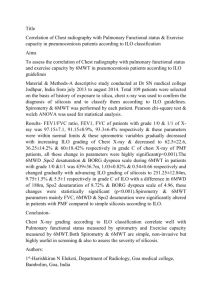European Politics and Policy
advertisement
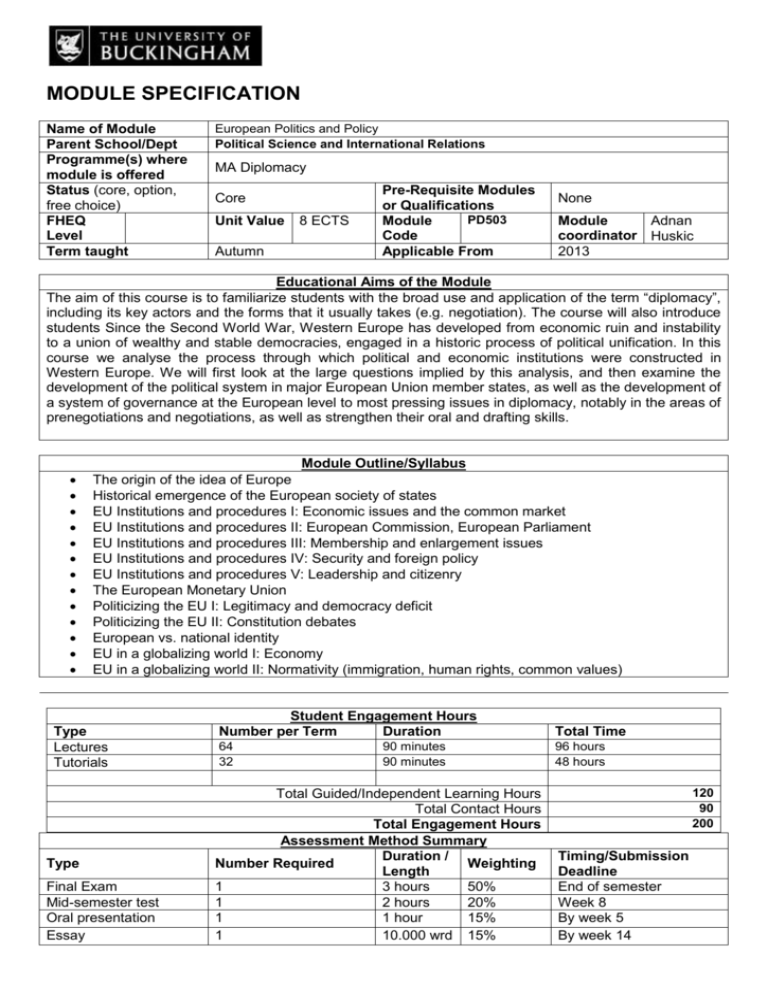
MODULE SPECIFICATION Name of Module Parent School/Dept Programme(s) where module is offered Status (core, option, free choice) FHEQ Level Term taught European Politics and Policy Political Science and International Relations MA Diplomacy Core Unit Value Autumn 8 ECTS Pre-Requisite Modules or Qualifications PD503 Module Code Applicable From None Module Adnan coordinator Huskic 2013 Educational Aims of the Module The aim of this course is to familiarize students with the broad use and application of the term “diplomacy”, including its key actors and the forms that it usually takes (e.g. negotiation). The course will also introduce students Since the Second World War, Western Europe has developed from economic ruin and instability to a union of wealthy and stable democracies, engaged in a historic process of political unification. In this course we analyse the process through which political and economic institutions were constructed in Western Europe. We will first look at the large questions implied by this analysis, and then examine the development of the political system in major European Union member states, as well as the development of a system of governance at the European level to most pressing issues in diplomacy, notably in the areas of prenegotiations and negotiations, as well as strengthen their oral and drafting skills. Module Outline/Syllabus The origin of the idea of Europe Historical emergence of the European society of states EU Institutions and procedures I: Economic issues and the common market EU Institutions and procedures II: European Commission, European Parliament EU Institutions and procedures III: Membership and enlargement issues EU Institutions and procedures IV: Security and foreign policy EU Institutions and procedures V: Leadership and citizenry The European Monetary Union Politicizing the EU I: Legitimacy and democracy deficit Politicizing the EU II: Constitution debates European vs. national identity EU in a globalizing world I: Economy EU in a globalizing world II: Normativity (immigration, human rights, common values) Type Lectures Tutorials Type Final Exam Mid-semester test Oral presentation Essay Student Engagement Hours Number per Term Duration Total Time 64 32 96 hours 48 hours 90 minutes 90 minutes Total Guided/Independent Learning Hours Total Contact Hours Total Engagement Hours Assessment Method Summary Duration / Number Required Weighting Length 1 3 hours 50% 1 2 hours 20% 1 1 hour 15% 1 10.000 wrd 15% 120 90 200 Timing/Submission Deadline End of semester Week 8 By week 5 By week 14 Intended Learning Outcomes: Module Outcomes Teaching and Learning Strategy: At the end of the Course, students should be able to: 1. Show critical understanding of the main concepts central to development of European integration. 2. Comprehend institutional design and functioning of EU institutions, as well as the main problems of its supranational structures. 3. Construct theoretically sound and empirically substantiated analysis on current issues and processes of relevance to the EU. 4. Show comprehensive understanding of the current political phenomena, events and developments. → Assessment Strategy → Practical Skills 1. Knowledge of EU current issues and developments 2. Debating skills 3. Interpret EU diplomatic texts 1. Course readings and class discussions. (ILO: 1-4) 2. Individual and group presentations and discussions. (ILO: 1-4) 3. Classroom assignments and simulations. (ILO: 1-4) 4. Lectures/presentations. (ILO: 1-4) 5. Tutorial classes on particular topics. (ILO: 1-4) 1. Course work –class participation, oral presentation and discussion (15%), research paper (15%), mid-term exam (20%) (ILO: 1-4) 2. Final Exam – 50% (ILO: 1-4) Teaching and Learning Strategy: → 1. Practical with tutor-lead support (PS: 1-3) 2. Individual project assignment (PS: 2-3) 3. Simulation games (PS: 2) Assessment Strategy → 1. Written Exam (PS: 1,3) 2. Individual Project (PS: 2, 3) 3. Essay (PS: 1,3) Transferable Skills Teaching and Learning Strategy: 1. Evaluate ideas, arguments and texts. 2. Research & critically evaluate information. 3. Carry out public speaking, clarity of oral argument and presentation. 4. Present effective written argument and presentation. 5. Demonstrate multi-perspective analysis of political issues and of engaging with different viewpoints. 6. Critically analyze and interpret political events and phenomena, applying theoretical frameworks in different, new contexts and linking empirical data with theoretical frameworks. 7. Familiarize with the basic sources of information from which to renew and update knowledge of changes and developments in European Union politics. → 1. Course readings and class discussions. (TS: 1, 2,3,5) 2. Individual and group presentations and discussions (1-7) 3. Classroom assignments and simulations. (TS 1, 3, 5, 6). 4. Written assignments. (TS: 1, 2, 4, 5, 6, 7) 5. Individual discussions with students as needed and provide detailed feedback on their writings. (TS: 1, 2, 3, 4, 5, 7) → Assessment Strategy 1. Course work –class participation, oral presentation and discussion (15%), research paper (15%), mid-term exam (20%) 2. Final Exam – 50% (TS: 1-7) Key Texts and/or other learning materials McCormick, J. (2007). The European Union: Politics and Policies. Westview Press. Nugent, N. (2010). The Government and Politics of the European Union. Palgrave Macmillan, 7th edition. Cini, M. (2010). European Union Politics. Oxford University Press USA, 3rd edition. Journal articles: Cross, J. P. (2012). Interventions and negotiation in the Council of Ministers of the European Union. European Union Politics, vol. 12. Huysmans, J. (2002). The European Union and the Securitization of Migration. JCMS: Journal of Common Market Studies, Volume 38, Issue 5 Klüver, H. (2011). The contextual nature of lobbying: Explaining lobbying success in the European Union . European Union Politics; vol. 12, 4 Rachid A., Joost van Spanje, and Claes de Vreese (2011). Talking Turkey: Anti-immigrant attitudes and their effect on support for Turkish membership of the EU. European Union Politics, vol. 12. Movies: End of Nations: EU Takeover and The Lisbon Treaty Please note: This specification provides a concise summary of the main features of the module and the learning outcomes that a typical student might reasonably be expected to achieve and demonstrate if he/she takes full advantage of the learning opportunities that are provided. More detailed information on the learning outcomes, content and teaching, learning and assessment methods of each module and programme can be found in the departmental or programme handbook. The accuracy of the information contained in this document is reviewed annually by the University of Buckingham and may be checked by the Quality Assurance Agency. Date of Production 26 August 2013 Date approved by School Learning and Teaching Committee Date approved by School Board of Study Date approved by University Learning and Teaching Committee Date of Annual Review
